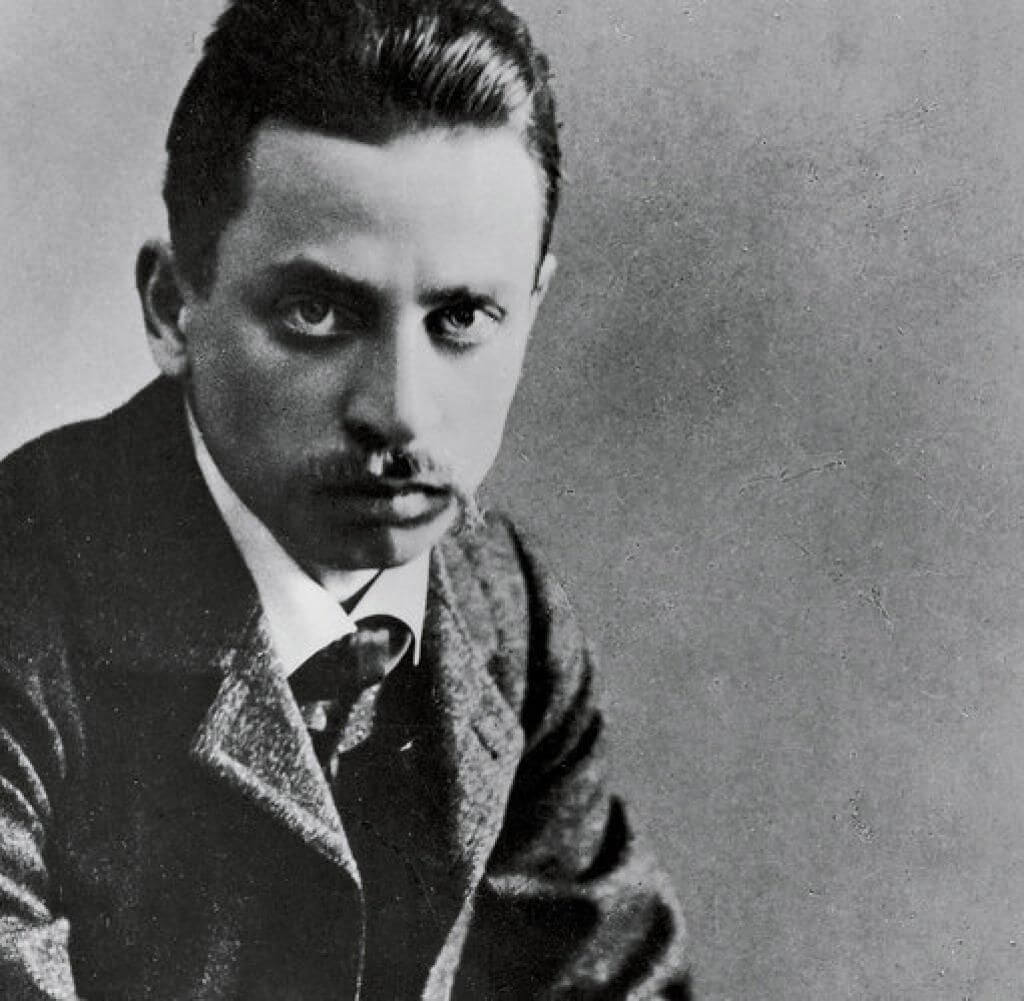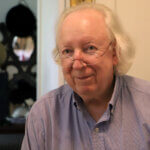
Essay
Preface: Wild Rose Bush
by Wally Swist
Schlaflied
Einmal wenn ich dich verlier,
wirst du schlafen können, ohne
dass ich wie eine Lindenkrone
mich verflüstre über dir?
Ohne dass ich hier wache und
Worte, beinah wie Augenlider,
auf deine Brüste, auf deine Glieder
niederlege, auf deinen Mund.
Ohne dass ich dich verschließ
und dich allein mit Deinem lasse
wie einen Garten mit einer Masse
von Melissen und Stern-Anis.
Lullaby
If I lose you one day,
will you then sleep alone
without my murmuring beside you,
as do branches of the linden?
Without my lying beside you, always
astir and leaving you with my words,
lowered as eyelids, across your breasts,
your arms, your mouth.
Without my watching over you, so I might
secure you, so you can be alone with
who you are, as in a garden, among clusters
of aromatic mint, the spicy star-anise.
From New Poems, 1907
I first came upon “Lullaby” when I was twenty and just beginning to read M. D. Herter Norton’s translations of Rilke. My reading Rilke over the last fifty years has nourished me my entire lifetime. I return to Rilke and return yet again. I also knew Stephen Mitchell, when he was a graduate student at Yale, and he would stop me on the street and excitedly show me his newest Rilke translations. Of course, Stephen is now considered one of the most immanent of Rilke’s translators.
However, certain poems reintroduce themselves to you over the decades, and “Lullaby” is one of them. Every time I read that poem, I see what one translator has done with it that differs from another. The poem, as lyrics, could reasonably be said to define what lyric poetry is. Each line needs a distinct lightness but firmness to carry it to its destined conclusion, which are fragrances themselves, nearly the aroma of childhood and its garden—both as metaphor and as physical image.
Almost no translation of “Lullaby” has disappointed me, but I have never found those translations adequate or fully accommodating of the rhythms, images, and lyrics that I felt, saw, and heard in the poetry. “The beauty of the German,” Stephen Mitchell would relay to me on one of the streets that intersected campus, busy with students, “is not easily transferable into our English. It isn’t as musical.”
Somehow, through my readings of the poem, through more than four decades, I saw what was a perfectly fashioned lyric, no more and no less. I worked with my own memories of the linden tree and its fragrance since there is a street in New Haven named Linden Street, which is redolent every spring. I worked with the sensuality of the second verse and my own memories of what Rilke writes in The Notebooks of Malte Laurids Brigge as “the memories of many nights of love.” I worked with the final image, that of the garden and the solitude one might find there, in Rilke’s respect of honoring our aloneness but, in doing so often enough, feeling the essence and closeness of another.
However, the poem needs to hit its marks, like a gymnast, and it must become the arcs within itself in matching the music it creates within that music. What I hear in “Lullaby” is not only the music of ourselves by which we can fall asleep and dream but by which we awaken in remembering the essence of our very selves.
Decades since, in October 2017, I revisited Rilke, as I often have over the years, in my rereading of The Duino Elegies and The Orpheus Sonnets. The sequences availed themselves to me as they had never done before. I experienced a mystical breakthrough in my reading of the work. This resulted in my writing a couple of tribute poems to Rilke, “Two Echoes for Rilke” and “Rilke, at the Chateau de Muzot.” This was followed by my translating a poem from The Orpheus Sonnets, Part Two, XII.
In the summer of 2018, I had another mystical experience in my reading Rilke. Doors opened where I wasn’t aware any doors were. I came upon C. F. McIntyre’s 1947 translation of Rilke’s Das Marienleben, or The Life of the Virgin Mary, a sequence of thirteen poems of various lengths. The sequence was composed by Rilke in 1900 during his Worpswede art colony years. This was before his years spent under the aesthetic tutelage of Rodin as his personal secretary. This was on the cusp of the Romanticism of the nineteenth century and the modernism of the twentieth century.
What attracted me about Das Marienleben was its tribute to the Virgin Mary. If it is at all possible to remove the aspects of religion from the sequence, we can see that it is one of the many poems Rilke wrote that can be called anima poems. Rilke was reading, or at least aware of, C. G. Jung at this time. Innately discovering his own depths of anima, which he projected into his poetry, as well as into the women who surrounded him, was to become an intrinsic psycho-spiritual practice that he would follow throughout his entire life.
Although, if we only look at Das Marienleben as a tribute to Christ’s mother, Mary, it is still a richly lyrical and narrative selection of poetry written by a young Rilke, in his mid-twenties, already in touch with his core genius. The sequence would be published as a book some years later, just before WWI, in 1913. Originally, it was to be issued with accompanying artwork by the Worpswede artist Paul Vogeler, but Rilke vetoed the idea, and it was published without Vogeler’s illustrations. The book would go on to sell some 50,000 copies between 1913 and 1923. Although Rilke was, indeed, a popular German poet, such a number of copies sold and such a number of successive printings only buoyed the notion that Das Marienleben was worth reading.
What follows here is my own interpretation of Das Marienleben, or The Life of the Virgin Mary. I had occasion to attend several services led by the nondenominational healing Roman Catholic priest, Father Ralph DiOrio. In listening to him speak once, I heard him relay that he not only loved the Virgin Mary deeply but also intended to write a book about her. It is my own theory that Father Ralph had already written that book in both his heart and mind since among the many books he did write, the book regarding Mary was not one of them. In my remembering that upon coming upon Das Marienleben, my immediate thought was my vindicating Father Ralph and providing another poetic interpretation of the poetic sequence that might be a bit more modern and one that opened to the reader in more spiritually appealing ways a with a fresh syntax and vibrant imagery.
What also follows here is my own meager handful of translations of poems of Rilke’s that are either (as with Das Marienleben) not well-known or even somewhat unknown, such as the poem “The Bride,” written in 1900. Including my own tribute poems to Rilke was a second thought, really. However, with this segue, my intent was to further reveal my own impressions of the poet with my own poems—the sum of which became an ongoing conversation with Rilke.
Wilder Rosenbusch
Wie stehr er da vor den Verdunkelungen
des Regenabends, jung und rein;
in seinen Ranken schenkend ausgeschwungen
und doch versunken in sein Rose-sein;
die flachdn Bluten, da und dort schon offen,
jegliche ungewollt und ungepflegt:
so, von sich selbst unendlich ubertroffen,
und unbeschreiblich aus sich selbst erregt,
ruft er den Wandrer, der in abendlicher
Nachdenklichkeit den Weg voruberkommt:
Oh sieh mich stehn, sieh her, was bin ich sicher
und unbeschutzt und habe was mir frommt.
Wild Rose Bush
How it stands there in front of the gloom
of the rainy evening, young and pure;
its tendrils swinging out in giving
and yet immersed in its rose-ness;
the shallow blossoms, here and there already open,
each unwanted and neglected:
so infinitely surpassed by itself,
and indescribably aroused,
it summons the wanderer, who in the evening,
meditating, passes along the way:
Oh look at me, standing, look how sure I am
and unprotected and have what is useful to me.
Muzot, June 1, 1924
About the Author
 Wally Swist’s books include Huang Po and the Dimensions of Love (Southern Illinois University Press, 2012), selected by Yusef Komunyakaa for the 2011 Crab Orchard Open Poetry Competition, and A Bird Who Seems to Know Me, winner of the 2018 Ex Ophidia Poetry Prize. Recent essays, poems, and translations have or will appear in The Acentos Review, Chicago Quarterly Review, Commonweal, Full Bleed, Healing Muse, Illuminations, La Piccioletta Barca (U.K.), Pensive: A Journal of Global Spirituality, Presence, and Your Impossible Voice. Forthcoming books include If You’re the Dreamer, I’m the Dream: Selected Translations from Rilke’s Book of Hours (Finishing Line Press) and Aperture (Kelsay Books), poems regarding caregiving his wife through Alzheimer’s.
Wally Swist’s books include Huang Po and the Dimensions of Love (Southern Illinois University Press, 2012), selected by Yusef Komunyakaa for the 2011 Crab Orchard Open Poetry Competition, and A Bird Who Seems to Know Me, winner of the 2018 Ex Ophidia Poetry Prize. Recent essays, poems, and translations have or will appear in The Acentos Review, Chicago Quarterly Review, Commonweal, Full Bleed, Healing Muse, Illuminations, La Piccioletta Barca (U.K.), Pensive: A Journal of Global Spirituality, Presence, and Your Impossible Voice. Forthcoming books include If You’re the Dreamer, I’m the Dream: Selected Translations from Rilke’s Book of Hours (Finishing Line Press) and Aperture (Kelsay Books), poems regarding caregiving his wife through Alzheimer’s.



